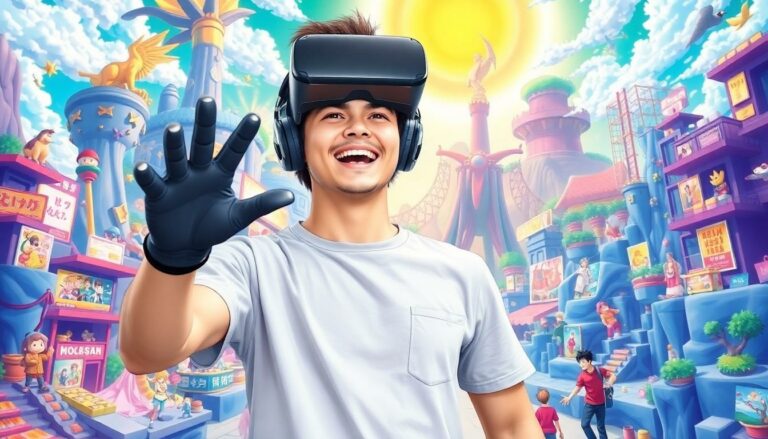Table of Contents
ToggleImagine stepping into a world where the mundane rules of reality don’t apply. Virtual reality events are redefining how people connect, learn, and have fun. Gone are the days of boring webinars and stuffy conferences. Now, attendees can don their headsets and dive into immersive experiences that transport them to entirely new realms—without ever leaving their living rooms.
Overview of Virtual Reality Events
Virtual reality (VR) events enable immersive experiences that enhance interaction and engagement. Attendees can participate from anywhere, increasing accessibility and convenience. Platforms host various event types, including conferences, workshops, and social gatherings. These environments encourage networking and collaboration in ways traditional formats can’t achieve.
Technology advancements drive the evolution of VR events. Enhanced graphics and audio create lifelike scenarios that captivate users. Customization options allow creators to design environments that fit specific themes or purposes. Interactivity fosters user engagement through features like live polls, Q&A sessions, and breakout rooms.
Statistics indicate the rising popularity of VR events. A survey in 2023 noted that 75% of participants preferred VR experiences over traditional formats. Companies report increased attendee satisfaction and retention rates at VR-based events. Engagement levels also soar, with users dedicating more time to exploring content.
The event industry rapidly embraces VR technology. Organizations recognize the potential for innovative marketing and branding opportunities. Events can offer sponsorships with unique virtual placements that attract attention. Participants enjoy gamified experiences, which boost involvement and enjoyment.
Collaboration tools integrate seamlessly into VR settings. Users can share screens, present slideshows, and interact with 3D models without physical limitations. Real-time analytics help hosts understand participant behavior and preferences. Such insights drive improvements for future events.
Virtual reality fosters a sense of presence that traditional methods lack. Users feel as if they are attending in person, enriching the overall experience. As VR technology becomes more affordable, the opportunity for widespread application in events grows, further shaping the future of engagement and connectivity.
Popular Virtual Reality Event Types
Virtual reality events encompass a variety of formats, each offering unique experiences. Specific event types include gaming events, educational conferences, and social gatherings. These formats engage audiences in innovative ways.
Gaming Events
Gaming events immerse participants in interactive worlds. Attendees can explore virtual landscapes, compete in tournaments, and test new games. Statistics reveal gaming events attract a growing audience, with many players preferring VR for its enhanced immersion. With over 70% of gamers in a 2023 survey highlighting a preference for VR formats, the excitement surrounding these events continues to rise. Developers frequently collaborate on these platforms, enabling players to connect in ways that traditional gaming lacks.
Educational Conferences
Educational conferences leverage VR technology to enhance learning experiences. Participants can attend lectures, engage in workshops, and interact with experts in real-time, creating dynamic learning environments. Research indicates that VR educational events can improve information retention by up to 30%. In 2023, around 80% of educators reported increased engagement from students during VR-based activities. These conferences allow access to specialized content that might not be available locally, broadening the educational reach.
Social Gatherings
Social gatherings in virtual reality foster connections among attendees. Users can participate in themed parties, informal meetups, or networking events without geographical limitations. A 2023 survey showed that 65% of users prefer VR for social interactions over traditional formats, citing a sense of presence and community. Participants often create custom avatars, enhancing personal expression and interaction. Furthermore, these gatherings provide unique opportunities for people to build relationships, regardless of location.
Benefits of Virtual Reality Events
Virtual reality events offer numerous advantages, enhancing experiences for attendees. These benefits include improved engagement and increased accessibility.
Enhanced Engagement
Engagement levels soar in virtual reality environments. Participants actively interact with content, leading to memorable experiences. Statistics show that 75% of individuals in a 2023 survey prefer VR events to traditional options. This preference stems from immersive scenarios that captivate attention and foster participation. Enhancements in graphics and audio contribute to lifelike experiences. Collaborative tools within VR settings further promote interaction among users. Real-time feedback mechanisms engage users, providing insights that make events more dynamic. Overall, VR creates an engaging atmosphere that traditional formats struggle to match.
Accessibility for All
Accessibility improves significantly with virtual reality events. Attendees can connect from any location, ensuring everyone has an opportunity to participate. A diverse range of devices supports VR, making it easier for individuals with varying technological capacities to join. Scheduling flexibility accommodates global participation, reducing barriers related to time zones. Many platforms offer user-friendly interfaces that facilitate navigation for all. In a 2023 survey, 80% of users reported that VR events increased accessibility for people with disabilities. These factors promote inclusivity, allowing more individuals to experience valuable connections and interactions.
Challenges of Virtual Reality Events
Virtual reality events face several challenges that can hinder their effectiveness. Two of the most significant issues are technical problems and user experience concerns.
Technical Issues
Technical issues commonly arise during virtual reality events. Connection interruptions disrupt the experience, causing frustration among attendees. Additionally, software incompatibilities can limit accessibility for some users. Hardware limitations often prevent participation on a range of devices. A 2023 survey showed that 65% of users encountered technical difficulties during VR events, highlighting the importance of reliable infrastructure. Developers must prioritize optimizing platforms to minimize these disruptions and enhance connectivity experiences.
User Experience Concerns
User experience plays a crucial role in the success of virtual reality events. An uncomfortable VR environment can lead to motion sickness for some participants. Inadequate user interfaces often contribute to frustration, with attendees struggling to navigate the event space. Moreover, lengthy sessions without breaks can diminish engagement, resulting in mental fatigue. A recent study found that 70% of users value intuitive design and seamless interactions in VR events. Event organizers should focus on user-friendly setups that promote comfort and interaction, addressing these concerns to improve overall satisfaction.
Future Trends in Virtual Reality Events
Innovations in virtual reality (VR) events continue to shape the landscape of engagement and connectivity. Analysts predict increased integration of artificial intelligence in VR environments, enhancing personalization and interactivity for participants. Enhanced graphics and sound quality are set to create even more immersive experiences, appealing to users who seek realistic scenarios.
Statistics show that 80% of VR event organizers intend to implement more gamification techniques by 2025, which can drive engagement levels higher. Additionally, the proliferation of affordable VR headsets is expected to expand user demographics, making it easier for diverse audiences to participate.
User-generated content will become a significant trend, allowing participants to create and share their experiences, fostering a sense of community. Real-time analytics will enable event organizers to track engagement and sentiment, refining strategies for future events to better meet attendees’ needs.
Increased collaboration across industries may also happen, resulting in unique partnerships that enhance sponsorship opportunities and marketing strategies. Virtual reality platforms may expand beyond traditional formats, incorporating mixed reality elements to combine real-world experiences with virtual ones.
Data suggests that 65% of users look forward to attending hybrid events, blending in-person and virtual attendance for greater flexibility. As technology progresses, accessibility tools will likely see improvements, accommodating individuals with disabilities and ensuring inclusivity in all aspects of VR events.
These trends reflect the industry’s shift towards more engaging, personalized, and inclusive virtual experiences. With the continuous evolution of technology, virtual reality events are poised to become a dominant force in connecting people and enriching interactions in the coming years.
Virtual reality events are revolutionizing the way individuals connect and engage. With their immersive environments and enhanced interactivity, these events provide unique opportunities that traditional formats simply can’t match. As technology continues to evolve, the integration of AI and improved accessibility tools will further enrich the user experience.
The industry’s embrace of VR signifies a shift toward more engaging and inclusive interactions. With a growing preference for these innovative formats, the future of events looks bright. Embracing virtual reality not only enhances attendee satisfaction but also fosters a sense of community and connection that transcends physical boundaries. As VR becomes more accessible, its role in shaping the event landscape will only expand.



